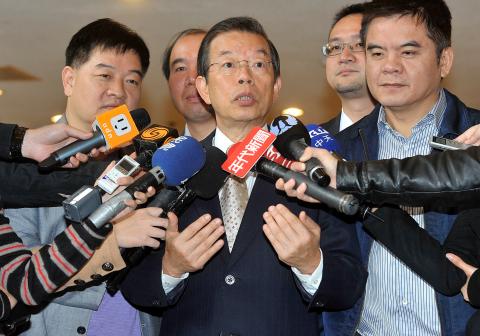Democratic Progressive Party (DPP) Chairman Su Tseng-chang (蘇貞昌) yesterday said he would submit a proposal for the establishment of a DPP China affairs department at a party meeting on Wednesday, but party heavyweights said the DPP should solidify its cross-strait position before the department is set up.
Former premier Frank Hsieh (謝長廷) told reporters in Taipei yesterday that he and Su both think it is the right time to set up the department since the Chinese Communist Party has concluded its18th Party Congress and ushered in its new leadership.
However, Hsieh said he expected the DPP to form a clear position on cross-strait relations before the proposed body becomes operational.

Photo: Chien Jung-fong, Taipei Times
The party plans to deal with the motion to establish the department at its Central Standing Committee meeting on Wednesday.
Hsieh said the validity of his “constitutional one China” (憲法一中) framework and how the party interprets its 1999 resolution on Taiwan’s future should be discussed in the meeting.
The former premier added that the “one China” in his framework is the Republic of China (ROC).
He said the party’s 1999 resolution on Taiwan’s future stipulates that the DPP unilaterally opposes the “one China” principle championed by Beijing, but at the same time recognizes the ROC.
Those interpretations need to be further be integrated and a consensus on the DPP’s cross-strait position formed, he added.
Asked whether he had been told by Su to lead the proposed department, Hsieh said Su had not discussed the issue with him.
Meanwhile, Alex Huang (黃重諺), a spokesman for former DPP chairperson Tsai Ing-wen’s (蔡英文) office, said that Tsai agreed with Hsieh and Su the party should integrate the opinions of its members on Taiwan-China relations before the department is established.
DPP spokesperson Wang Min-sheng (王閔生) said the department would surely invite Hsieh and Tsai to join its operations, but Su has not formally invited anyone to lead the department.

Chinese spouse and influencer Guan Guan’s (關關) residency permit has been revoked for repeatedly posting pro-China videos that threaten national security, the National Immigration Agency confirmed today. Guan Guan has said many controversial statements in her videos posted to Douyin (抖音), including “the red flag will soon be painted all over Taiwan” and “Taiwan is an inseparable part of China,” and expressing hope for expedited reunification. The agency last year received multiple reports alleging that Guan Guan had advocated for armed reunification. After verifying the reports, the agency last month issued a notice requiring her to appear and explain her actions. Guan

GIVE AND TAKE: Blood demand continues to rise each year, while fewer young donors are available due to the nation’s falling birthrate, a doctor said Blood donors can redeem points earned from donations to obtain limited edition Formosan black bear travel mugs, the Kaohsiung Blood Center said yesterday, as it announced a goal of stocking 20,000 units of blood prior to the Lunar New Year. The last month of the lunar year is National Blood Donation Month, when local centers seek to stockpile blood for use during the Lunar New Year holiday. The blood demand in southern Taiwan — including Tainan and Kaohsiung, as well as Chiayi, Pingtung, Penghu and Taitung counties — is about 2,000 units per day, the center said. The donation campaign aims to boost

The Kaohsiung Tourism Bureau audited six hotels in an effort to prevent price gouging ahead of Korean band BTS’ concert tour in the city scheduled for Nov. 19, 21 and 22 this year. The bureau on Friday said that the audits — conducted in response to allegations of unfair pricing posted on social media — found no wrongdoing. These establishments included the local branches of Chateau de Chine, Hotel Nikko, My Humble House, and Grand Hai Lai, it said, adding that the Consumer Protection Commission would have penalized price gougers had the accusations been substantiated. The bureau said the Tourism Development Act

The Central Weather Administration (CWA) said a magnitude 4.9 earthquake that struck off the coast of eastern Taiwan yesterday was an independent event and part of a stress-adjustment process. The earthquake occurred at 4:47pm, with its epicenter at sea about 45.4km south of Yilan County Hall at a depth of 5.9km, the CWA said. The quake's intensity, which gauges the actual effects of a temblor, was highest in several townships in Yilan and neighboring Hualien County, where it measured 4 on Taiwan's seven-tier intensity scale, the CWA said. Lin Po-yu (林柏佑), a division chief at the CWA's Seismological Center, told a news conference